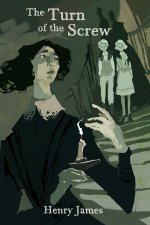 Before beginning a discussion of the tale proper, it will be pertinent to define the major questions. There seem to be three main possibilities within the plot or story line: 1) The ghosts are real, the children are possessed and the governess heroically does the best she can within her limitations and enjoys at least a partial victory; 2) The ghosts are real, the children are not possessed or even knowledgeable of them, and the governess hysterically over-reacts and makes an incredible error in supposing the children’s complicity and she herself is ignorantly responsible for the tragedy, and; 3) The ghosts are unreal, the children completely innocent, the governess is quite insane and it is some force of sheer psychotic evil in her that brings about a sort of ultimate ugliness.
Before beginning a discussion of the tale proper, it will be pertinent to define the major questions. There seem to be three main possibilities within the plot or story line: 1) The ghosts are real, the children are possessed and the governess heroically does the best she can within her limitations and enjoys at least a partial victory; 2) The ghosts are real, the children are not possessed or even knowledgeable of them, and the governess hysterically over-reacts and makes an incredible error in supposing the children’s complicity and she herself is ignorantly responsible for the tragedy, and; 3) The ghosts are unreal, the children completely innocent, the governess is quite insane and it is some force of sheer psychotic evil in her that brings about a sort of ultimate ugliness.
There are certainly some other combinations within these 3 main problems, or there are degrees of emphasis or meaning which could be shifted here or there, and there are several allegoric or symbolic interpretations which tend to euphemize or soften our views, but for the sake of simplicity and because these questions are ultimately unavoidable, we will deal with them only, and only straight forwardly. We should also note at this time the two not haphazardly chosen elements – indeed the two elements which are the very body of this “germ” which James nurtured to such epidemic proportions, which give the tale so much of 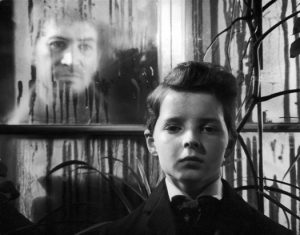 its…quality – ghosts and children. If we are preconceived on ghosts at all, it is probably toward a healthy skepticism of their existence: And if, as we probably are, preconceived about children, it is toward a belief in their basic innocence. It is this simple combination of elements, the crafty interplay between them, and the insistent luring in the opposite direction of our preconceptions by which we are so brilliantly asked by James for the absolute maximum, yet ultimately quite impossible, willingness to suspend our disbelief. So, with this firmly planted in our minds and being willing, though perhaps a little reluctant, to “walk into Hell for a Heavenly cause”, let’s begin this “excursion into chaos“.5
its…quality – ghosts and children. If we are preconceived on ghosts at all, it is probably toward a healthy skepticism of their existence: And if, as we probably are, preconceived about children, it is toward a belief in their basic innocence. It is this simple combination of elements, the crafty interplay between them, and the insistent luring in the opposite direction of our preconceptions by which we are so brilliantly asked by James for the absolute maximum, yet ultimately quite impossible, willingness to suspend our disbelief. So, with this firmly planted in our minds and being willing, though perhaps a little reluctant, to “walk into Hell for a Heavenly cause”, let’s begin this “excursion into chaos“.5
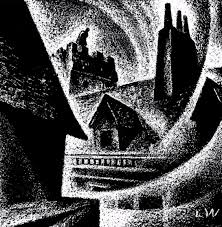 On our initial reading of the apparition’s first appearance to the governess from atop one of the two (we never find out which, and it seems that it may make a difference) crenelated old towers, we are probably inclined to accept it. We don’t yet know that it is Quint or that he is a ghost and there is nothing else outstandingly suspicious at this point to cause us to be skeptical of what we are being told. However, upon finishing the story and considering its development, we have perhaps developed a bit of doubt and skepticism that we didn’t at first have and find this a very logical scene to come back to for re-examination in the light (or darkness) of what we now know (or assume we do). As we re-examine we become aware of certain small details we missed before and it is always the case that the more we ourselves are like, in reality, what we can only suspect the governess being fictionally, the more provoked we become to conclude her completely deluded here. With a bit of irony we are likely to see these twigs of innuendo as the most gigantic trees of fact, these dew drops of hint as the vastest oceans of supportive evidence, and these merest wisps of suggestion as howling hurricanes of assuredness in our attempt to prove her quite unable to see things as they really are. Those of us that do this, of course, do so in an attempt to save our belief in the innocence of children, but for others of us the price for adherence to this interpretation seems quite high. Though we have perhaps salvaged these particular children, we have completely lost our sense of any overall worth to the book, not to mention our respect for the moral values of James. What can we say of a story that can be summed up with the sentence, “Insane governess frightens one innocent child to death and drives another into delirious fever”? Nothing too good. And yet the problem remains, for as slight as the evidence is at this point to support this conclusion, it nonetheless exists and cannot be said not to fit, with a little conjecture, some imaginative mental scarfing, and lots of psychological glue, into this proposed interpretation if there is not evidence to the contrary. So, and since to incriminate her seems to be the predominant tendency, let’s look briefly in the contrary direction to see if there isn’t some justification for believing her.
On our initial reading of the apparition’s first appearance to the governess from atop one of the two (we never find out which, and it seems that it may make a difference) crenelated old towers, we are probably inclined to accept it. We don’t yet know that it is Quint or that he is a ghost and there is nothing else outstandingly suspicious at this point to cause us to be skeptical of what we are being told. However, upon finishing the story and considering its development, we have perhaps developed a bit of doubt and skepticism that we didn’t at first have and find this a very logical scene to come back to for re-examination in the light (or darkness) of what we now know (or assume we do). As we re-examine we become aware of certain small details we missed before and it is always the case that the more we ourselves are like, in reality, what we can only suspect the governess being fictionally, the more provoked we become to conclude her completely deluded here. With a bit of irony we are likely to see these twigs of innuendo as the most gigantic trees of fact, these dew drops of hint as the vastest oceans of supportive evidence, and these merest wisps of suggestion as howling hurricanes of assuredness in our attempt to prove her quite unable to see things as they really are. Those of us that do this, of course, do so in an attempt to save our belief in the innocence of children, but for others of us the price for adherence to this interpretation seems quite high. Though we have perhaps salvaged these particular children, we have completely lost our sense of any overall worth to the book, not to mention our respect for the moral values of James. What can we say of a story that can be summed up with the sentence, “Insane governess frightens one innocent child to death and drives another into delirious fever”? Nothing too good. And yet the problem remains, for as slight as the evidence is at this point to support this conclusion, it nonetheless exists and cannot be said not to fit, with a little conjecture, some imaginative mental scarfing, and lots of psychological glue, into this proposed interpretation if there is not evidence to the contrary. So, and since to incriminate her seems to be the predominant tendency, let’s look briefly in the contrary direction to see if there isn’t some justification for believing her.
 Is it really so odd for a young girl of twenty, relatively isolated in beautiful country surroundings, to daydream in such a manner about such a subject and then manipulate the whole to relate to her present situation? Most would agree that it isn’t. In fact, it would probably be considered more odd if any young person of either gender were not to do so. And odder still it may seem that even if she were as unbalanced as professor Goddard6 so imaginatively assumes she is, or as sexually repressed as Edmond Wilson7 and others give her credit for, and these pleasant imaginings did leave the mind and produce some psychic experience, that they should produce an apparition so unknown and unrelated to her present thoughts. And finally, we find it tending toward the impossible that a person so deranged to maintain such a crystal clear delusion should also possess the subtle intelligence and sensitivity to note things such as, “…the sense that my imagination had, in a flash, turned real…. It produced in me, this figure, in the clear twilight I remember, two distinct gasps of emotion, which were, sharply, the shock of my first and that of my second surprise. My second was a violent perception of the mistake of my first: the man who met my eyes was not the person I had precipitately supposed.” She goes on with more description to the degree that, though they will probably never be mathematically proven in-cohabitant, her ability to be self questioning and introspective, that we can see, and her ability to delude herself, which we suspect, seem to us to be at least extremely odd bed fellows. So odd, in fact, that if we are on her side, we can even go back if we like and perhaps argue that what some have seen as her predisposition toward delusion is actually, knowing as we do that she is writing after the occurrence, her ante disposition toward introspection, for it is from her own intelligently conscious volition that we are receiving all of our information. It would be as cruel of us to accuse her of ulterior intentions when she is just trying to be straight forward and honest as it would be for her to accuse the children of something of which they were innocent.
Is it really so odd for a young girl of twenty, relatively isolated in beautiful country surroundings, to daydream in such a manner about such a subject and then manipulate the whole to relate to her present situation? Most would agree that it isn’t. In fact, it would probably be considered more odd if any young person of either gender were not to do so. And odder still it may seem that even if she were as unbalanced as professor Goddard6 so imaginatively assumes she is, or as sexually repressed as Edmond Wilson7 and others give her credit for, and these pleasant imaginings did leave the mind and produce some psychic experience, that they should produce an apparition so unknown and unrelated to her present thoughts. And finally, we find it tending toward the impossible that a person so deranged to maintain such a crystal clear delusion should also possess the subtle intelligence and sensitivity to note things such as, “…the sense that my imagination had, in a flash, turned real…. It produced in me, this figure, in the clear twilight I remember, two distinct gasps of emotion, which were, sharply, the shock of my first and that of my second surprise. My second was a violent perception of the mistake of my first: the man who met my eyes was not the person I had precipitately supposed.” She goes on with more description to the degree that, though they will probably never be mathematically proven in-cohabitant, her ability to be self questioning and introspective, that we can see, and her ability to delude herself, which we suspect, seem to us to be at least extremely odd bed fellows. So odd, in fact, that if we are on her side, we can even go back if we like and perhaps argue that what some have seen as her predisposition toward delusion is actually, knowing as we do that she is writing after the occurrence, her ante disposition toward introspection, for it is from her own intelligently conscious volition that we are receiving all of our information. It would be as cruel of us to accuse her of ulterior intentions when she is just trying to be straight forward and honest as it would be for her to accuse the children of something of which they were innocent.
It has been suggested that she is completely and consciously lying about the sighting of this figure. This cannot be argued from this point in the story, but as we go on we find it disturbing that she has saved so much of her physical description of this figure for a time which came after she “made sure” it wasn’t anyone around the place or from the village. In other words, she could have, either from one of the workers at Bly or a talkative villager, found out about Quint and his ignoble history and worked her imaginings to fit her purposes and have the whole corroborated for our benefit by Mrs. Grose in the second sighting. Perhaps the first sighting was induced by that vague slip of the tongue by Mrs. Grose, “…he liked them young and pretty…”, which the governess momentarily wondered about, and the second induced by the strange story she heard about Quint one  way or the other. This would indeed make her a pathological liar, for if we can perhaps accord the first sighting to her delusion and the subtle hint by Mrs. Grose, we find it difficult to allow her to submit so completely to her subconscious all the characteristics and details of Quint that she uses in her description after the second sighting which she must so consciously have received from some real person in the vicinity. There is either something missing here, something too much, or even, in a quantum mechanical, Heisenburg Principle of Uncertainty way, a combination of both, for it is now beginning to stretch our imaginations to the breaking point to concede to her at one and the same time such absolute delusion, the ability to so deceptively and consciously lie, and the intelligence, coherency and introspection she shows in describing all of this. And what about the thinly cohesive connection between the two sightings, the ungentlemanly absence of a hat, which Mrs. Grose seems to think so conclusively descriptive in the second? It seems to stand ambiguously equally as proof for the truth, the delusion, and the lie: the truth because it is there, the delusion because it is so minor, and the lie because it is possible that she could have concocted the whole first sighting in her narrative ten years later (and yet, if she is lying so boldly, why not a bolder connection?).
way or the other. This would indeed make her a pathological liar, for if we can perhaps accord the first sighting to her delusion and the subtle hint by Mrs. Grose, we find it difficult to allow her to submit so completely to her subconscious all the characteristics and details of Quint that she uses in her description after the second sighting which she must so consciously have received from some real person in the vicinity. There is either something missing here, something too much, or even, in a quantum mechanical, Heisenburg Principle of Uncertainty way, a combination of both, for it is now beginning to stretch our imaginations to the breaking point to concede to her at one and the same time such absolute delusion, the ability to so deceptively and consciously lie, and the intelligence, coherency and introspection she shows in describing all of this. And what about the thinly cohesive connection between the two sightings, the ungentlemanly absence of a hat, which Mrs. Grose seems to think so conclusively descriptive in the second? It seems to stand ambiguously equally as proof for the truth, the delusion, and the lie: the truth because it is there, the delusion because it is so minor, and the lie because it is possible that she could have concocted the whole first sighting in her narrative ten years later (and yet, if she is lying so boldly, why not a bolder connection?).
But then, what can we think of this? The governess is telling Mrs. Grose what she saw at the window and is expressing her fears that this person may mean harm for the children. Not having given her minute physical description yet, she sees Mrs. Grose’s eyes light up with something already in her mind and writes, “Mrs. Grose’s large face showed me, at this, for the first time, the far away faint glimmer of a consciousness more acute. I somehow made out in it the delayed dawn of an idea I myself had not given her and that was as yet quite obscure to me. It comes back to me that I thought instantly of this as something I could get from her…”. 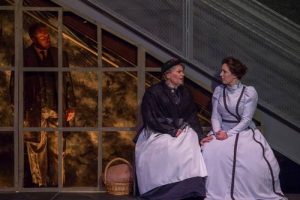 Mrs. Grose’s dawn of an idea here, we are bold to assume, is that she has vaguely guessed it is Quint, remembers his relationship with the children, knows he is dead and if he is indeed around and about he must be a ghost, and sees herself cause to fear for the children. There is something very curious here. It is very difficult to assign the proper chronology to the formation of these thoughts within the governess and there seem to be certain elements in them whose existence is only possible after the identification of Quint later in the story. If we see the major portion of these thoughts occurring at the actual conversation, it then seems to us that she is indeed leading Mrs. Grose, but on the other hand, if we see them occurring at the time of her writing, we must grant her some degree of leniency, for she already knows what this action will lead to. We may even partially forgive her for leading Mrs. Grose “stroke by stroke” for the extraction of this “dawn of an idea” and “seeing the way to help her” toward what she already knows with hindsight will be the identification of Quint. However, in either case, it seems incredibly bold of the governess to presuppose this “consciousness more acute” in Mrs. Grose on such scant description at this point. But maybe she deserves this boldness for actually having seen a ghost and heroically deciding to deal with it instead of running away.
Mrs. Grose’s dawn of an idea here, we are bold to assume, is that she has vaguely guessed it is Quint, remembers his relationship with the children, knows he is dead and if he is indeed around and about he must be a ghost, and sees herself cause to fear for the children. There is something very curious here. It is very difficult to assign the proper chronology to the formation of these thoughts within the governess and there seem to be certain elements in them whose existence is only possible after the identification of Quint later in the story. If we see the major portion of these thoughts occurring at the actual conversation, it then seems to us that she is indeed leading Mrs. Grose, but on the other hand, if we see them occurring at the time of her writing, we must grant her some degree of leniency, for she already knows what this action will lead to. We may even partially forgive her for leading Mrs. Grose “stroke by stroke” for the extraction of this “dawn of an idea” and “seeing the way to help her” toward what she already knows with hindsight will be the identification of Quint. However, in either case, it seems incredibly bold of the governess to presuppose this “consciousness more acute” in Mrs. Grose on such scant description at this point. But maybe she deserves this boldness for actually having seen a ghost and heroically deciding to deal with it instead of running away.
And besides, we will never know just how much we are supposing the degree of knowledge the governess is presupposing in Mrs. Grose. We just don’t know whether to view this sequence of thoughts as proof for the truth of her tale, or as a cunning deception in application for it. Also, how are we to mentally grasp these words written by the governess after running outside and not finding her visitor immediately visible, “He was either there or not there: not there if I didn’t see him.”? Is she presupposing him a ghost before she knew? Can we forgive her memory for only having thought this occurred to her at this time? Or, has she some literary license to insert this here because of her heroic struggle?
 We are caught in a curious situation here which is somewhat similar to the one in which we find ourselves when viewing the picture of the white vase on the black background, or the two black faces looking at each other on the white background. We can almost interpret the story either way depending on what our minds are blocking out or accepting, but we can in no way interpret it as a whole. As in the vase/faces picture we may somehow marvel at our not being able to label it as a whole and our inability to see both things at the same time, but we can’t stop with this comparison, for lying at the bottom of James’ picture is a dead child, so it’s not this simple. Besides, there seem to be elements in each view of the story’s picture that almost insist that the other view be true. It is difficult for us to believe that the governess is as insane as she must need be to conjure up these apparitions as clearly and as often as she does and still possess the intelligence, coherency and logical capabilities that she also must to give us this story. If she is as great a liar as to pass on to Mrs. Grose and us as an original sighting the things which she had consciously taken in from some worker at Bly or a villager, how is it that she doesn’t insert other lies into strategic spots in the story to extract herself completely from our doubt? And yet, to believe she is telling the truth has its own extreme difficulties; not only the ones we have already encountered and the many more within the rest of the story, but we have our own opinions about the existence of ghosts which we of necessity turn to because of the all too graphic and all too evil consequences to two young children whom we would greatly prefer to believe basically innocent.
We are caught in a curious situation here which is somewhat similar to the one in which we find ourselves when viewing the picture of the white vase on the black background, or the two black faces looking at each other on the white background. We can almost interpret the story either way depending on what our minds are blocking out or accepting, but we can in no way interpret it as a whole. As in the vase/faces picture we may somehow marvel at our not being able to label it as a whole and our inability to see both things at the same time, but we can’t stop with this comparison, for lying at the bottom of James’ picture is a dead child, so it’s not this simple. Besides, there seem to be elements in each view of the story’s picture that almost insist that the other view be true. It is difficult for us to believe that the governess is as insane as she must need be to conjure up these apparitions as clearly and as often as she does and still possess the intelligence, coherency and logical capabilities that she also must to give us this story. If she is as great a liar as to pass on to Mrs. Grose and us as an original sighting the things which she had consciously taken in from some worker at Bly or a villager, how is it that she doesn’t insert other lies into strategic spots in the story to extract herself completely from our doubt? And yet, to believe she is telling the truth has its own extreme difficulties; not only the ones we have already encountered and the many more within the rest of the story, but we have our own opinions about the existence of ghosts which we of necessity turn to because of the all too graphic and all too evil consequences to two young children whom we would greatly prefer to believe basically innocent.
 It is, of course, these children that make the story very much of what it is. What happens to Miles and Flora, and how it happens, is the focal point of our sense of horror. It is their final outcome which has been the center of the enduring controversy and it has been in an attempt to somehow dispel or justify their unhappy fate that all the fantastic, and fantastically different, interpretations of this tale have been argued. Indeed, James seems to be asking awfully much of us and for some it appears to be too much. John Lydenburg, in an intelligent criticism that stays within the intended bounds, has seen that “This is not a study of the governess’ unstable psyche – it is not a ‘study’ of anything. It is a story in which a hysterical woman turns a quiet summer into a fall of dark hatred and tragedy”.8 By staying within the story line he is naturally upset by what he sees as the only logical conclusion. With or without the ghosts, he sees the final outcome of this little book as ultimately evil. He is righteously indignant at being served up this “meadow muffin” with his tea, for no matter how much butter and honey are put on it, and no matter by what respectable personage it is offered, he just can’t swallow it. And rightly so – if this is all there is.
It is, of course, these children that make the story very much of what it is. What happens to Miles and Flora, and how it happens, is the focal point of our sense of horror. It is their final outcome which has been the center of the enduring controversy and it has been in an attempt to somehow dispel or justify their unhappy fate that all the fantastic, and fantastically different, interpretations of this tale have been argued. Indeed, James seems to be asking awfully much of us and for some it appears to be too much. John Lydenburg, in an intelligent criticism that stays within the intended bounds, has seen that “This is not a study of the governess’ unstable psyche – it is not a ‘study’ of anything. It is a story in which a hysterical woman turns a quiet summer into a fall of dark hatred and tragedy”.8 By staying within the story line he is naturally upset by what he sees as the only logical conclusion. With or without the ghosts, he sees the final outcome of this little book as ultimately evil. He is righteously indignant at being served up this “meadow muffin” with his tea, for no matter how much butter and honey are put on it, and no matter by what respectable personage it is offered, he just can’t swallow it. And rightly so – if this is all there is.
But this can’t be all there is. There absolutely has to be more than this merely contrived literarily eloquent portrayal of a wholly unpalatable occurrence. We think it would take a less well-adjusted mind than James proved he had throughout the rest of his long and brilliant literary career to term a story with a theme like this an “amuzette”. We hope for more. He is just taking too much not to be giving something in return. He just couldn’t have put his literary and moral reputation on the line like this without some justification for it.
Perhaps the most unfortunate turn that criticism has taken in its attempt to evaluate this tale is, from an inability to find any intelligence in the surface story, to relegate its main meaning and value to metaphor, allegory, or symbol–Unfortunate because the pieces written in this vein have been intelligent to the point of brilliance. In the end, however, though they euphemize, dissipate some of the intensity, and remove us a step from reality, they come to the same basic conclusions as a story line interpretation and are as unable to dispel or justify the evil except in the terms of some form they have forced. In some cases the evil which we are already having a hard time facing is actually profounded by its connection to something else and is made worse instead of being dispersed as we might have hoped. It wouldn’t do to try to argue that very much, if not most, of what these symbolists see does not exist, for James was too consistent in some areas to be taken otherwise, but this consistency is similar to that by which we are urged to believe in the ghosts – it becomes completely inconsistent when subjected to the insistence of all the contrary data. We are only free to see these parallels of symbol and allegory when we force an interpretation of the story line, and this can’t be done.
And yet the suggestion of all of this is here and these analyses have done several important things. By reading the story as a poem, Robert Heilman has managed to remain unintimidated by the story line. He sees that “…realistic details had become merely the covering for a content that was far from realistic.”9 He has resisted, as he thinks we all must, “…the impulse to line up, on a secondary level of meaning, exact equivalents [to the poetic elements] for the narrative elements, for such procedures stem from the rude assumption that every part of the story is a precision tooled cog in an allegorical machine.”10 Whether this reasoning is entirely  correct or not, it has at least helped him to accept the possession by evil, on an allegorical level at least, of the children. In other words, he has seen the possibility of the children being possessed in the text, which does exist, and has implied as tonal, allegorical fact that they are (though this is an eternal question), for it fits his thesis. This assumption is one that story line interpretations can’t quite bring themselves to consider and it seems to take this extra step of removal from reality to create the boldness to envision such a possibility. The important thing to note is that it can be, and has been, read this way. Mr. Heilman goes on to say, however, that, “We have then, a modern late-fall defeat patterned on the ancient spring-tide victory. To transmit its quality and to embrace all of its associations, may we not call it a Black Easter.” He sees this Christian association to the story as one “…by which it transcends the mere horror story and achieves its own kind of greatness.”11
correct or not, it has at least helped him to accept the possession by evil, on an allegorical level at least, of the children. In other words, he has seen the possibility of the children being possessed in the text, which does exist, and has implied as tonal, allegorical fact that they are (though this is an eternal question), for it fits his thesis. This assumption is one that story line interpretations can’t quite bring themselves to consider and it seems to take this extra step of removal from reality to create the boldness to envision such a possibility. The important thing to note is that it can be, and has been, read this way. Mr. Heilman goes on to say, however, that, “We have then, a modern late-fall defeat patterned on the ancient spring-tide victory. To transmit its quality and to embrace all of its associations, may we not call it a Black Easter.” He sees this Christian association to the story as one “…by which it transcends the mere horror story and achieves its own kind of greatness.”11
Well, perhaps this is a sort of greatness, but some of us might be open to another interpretation were there one offered. Besides, if we are looking for Christian symbolism, perhaps a simpler, more straightforward analogy might be  made between the governess and Miles and the Blessed Virgin and her son Jesus. In both cases we have strong women telling us of supernatural phenomena, the truth of which rests entirely on their individual good words. The existence of these phenomena affects both boys, either directly or indirectly, quite strongly and in the end is responsible for both their deaths. If we accept as undiluted truth the observations of these women then we certainly do have a couple of incredibly strong, noble and courageous women. On the other hand, if we have anything less than the truth, we have another story altogether.
made between the governess and Miles and the Blessed Virgin and her son Jesus. In both cases we have strong women telling us of supernatural phenomena, the truth of which rests entirely on their individual good words. The existence of these phenomena affects both boys, either directly or indirectly, quite strongly and in the end is responsible for both their deaths. If we accept as undiluted truth the observations of these women then we certainly do have a couple of incredibly strong, noble and courageous women. On the other hand, if we have anything less than the truth, we have another story altogether.
To carry it further we might even strain a comparison between the Master at Harley Street and the Creator, or between Joseph and the faithful, staunch and gullible Mrs. Grose. However, as we add and subtract characters and substitute genders this Christian analogy falls by the wayside at least as quickly as any other and shouldn’t be dawdled over too long on the way toward a more encompassing understanding of the story in the ‘screwturnian’ way that James meant it.
Oliver Evans also sees the children as possessed. By ascribing the main theme of The Turn of the Screw to be “appearance versus reality” he is able to point out that “…the lambs are not lambs at all; the children are not really children, but, as Mrs. Grose perceives in the end, are as old as evil itself.”12 The real horror is in the paradoxical presentation of the children who are so apparently divine, angelic, and innocent and then come to be shown for what they really are – ugly, fiendish and possessed. Their beauty is a lie and it is in the discovery of this lie that we are horrified. All of this is fine if we can accord to James the intention of giving us the harshest view of a sort of ultimate, unredeemable evil. This, however, didn’t seem to be his style.
These two examples are offered not as evidence that the children are possessed, but as proof of the possibility that they may be read to be. What we would like to do now is go to the text, see just where these possibilities exist, and take our boldness one step further by leaving allegory and symbolism behind. One, of course, could go in the opposite direction and search out all the artistically balanced evidence for the possibility of the children’s innocence, but because this is the direction that we inherently want to take, let’s go the other way. The children’s complicity with ghosts and evil is a definite possibility within the story, so we should at least have an open-minded look at it.
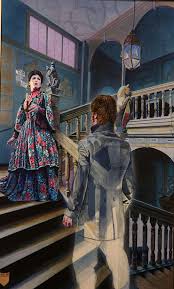 A good starting point is the first of the governess’ nocturnal perambulations. Something awakens her in the night. She gets up, arranges herself, leaves the room and has a meeting with Quint midway down the stairs on the landing. After describing this with the utmost clarity and somehow getting the best of him, for Quint is the one to flee, she goes back to her room and finds Flora missing from her bed, across which the sleeping curtain had been “deceivingly” redrawn. Flora is behind the window blind but immediately emerges and takes the naturally childish, or supernaturally cunning, advantage of the situation and accuses the governess of being naughtily absent. Recognizing the loss of her own advantage, the governess still manages to ask a few pertinent questions. Why was Flora looking out the window? Flora admits that she thought someone was walking out in the grounds, which we may believe she had reason to think in the
A good starting point is the first of the governess’ nocturnal perambulations. Something awakens her in the night. She gets up, arranges herself, leaves the room and has a meeting with Quint midway down the stairs on the landing. After describing this with the utmost clarity and somehow getting the best of him, for Quint is the one to flee, she goes back to her room and finds Flora missing from her bed, across which the sleeping curtain had been “deceivingly” redrawn. Flora is behind the window blind but immediately emerges and takes the naturally childish, or supernaturally cunning, advantage of the situation and accuses the governess of being naughtily absent. Recognizing the loss of her own advantage, the governess still manages to ask a few pertinent questions. Why was Flora looking out the window? Flora admits that she thought someone was walking out in the grounds, which we may believe she had reason to think in the 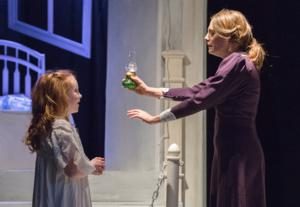 light of Quint’s recent visitation if we accept it – and, her actions tend to make us do so. When asked if she saw anything, she says, “Ah, no”. The governess writes, “At that moment, in the state of my nerves, I absolutely believed she lied”. Under the circumstances, we might grant to her this state of nerves, but we want to hear more in substantiation of her belief that Flora is lying. She asks Flora why she pulled her sleeping curtain closed. Flora answers in a rather unchildishly reasonable way, “Because I don’t like to frighten you”. The governess is quick, however, “But if I had, by your idea, gone out?”, to which Flora answers all too rationally, “Oh, but you know that you might come back, you dear, and that you have!”
light of Quint’s recent visitation if we accept it – and, her actions tend to make us do so. When asked if she saw anything, she says, “Ah, no”. The governess writes, “At that moment, in the state of my nerves, I absolutely believed she lied”. Under the circumstances, we might grant to her this state of nerves, but we want to hear more in substantiation of her belief that Flora is lying. She asks Flora why she pulled her sleeping curtain closed. Flora answers in a rather unchildishly reasonable way, “Because I don’t like to frighten you”. The governess is quick, however, “But if I had, by your idea, gone out?”, to which Flora answers all too rationally, “Oh, but you know that you might come back, you dear, and that you have!”
Vexing. It would seem to suit the accepted order of child/adult relationships much more compactly if it was little Flora who was frightened upon waking to find the governess missing from the room – at least to the extent that it would supersede her own concern of frightening the governess when she returned. But if she was self, or otherwise, possessed enough to retort so adroitly to the governess’ continuing questions, she would also be intelligent enough to go one step further and reason that she would, by the mere physical logistics of the event, have to frighten the governess sometime, either when they found each other walking around in the night, or when she got back into bed – unless, of course, there was some deception, or possibility thereof, which she planned to carry out until well after the governess was back in bed and fast asleep.
We have done this all in our minds of course, but it works as well as any other argument that we might conjure up to the contrary. Though this isn’t perhaps one of the most damning scenes, it serves to present the possibility here that perhaps Flora’s innocence is not quite as textually tenable as her happy chronological circumstance might force our minds to make it appear to be.
Further doubt is cast on both children in the next action which starts in a similar fashion to this last, but which comes to somewhat more. This time  the governess awakens to find Flora too engrossed at the window to notice her. She decides to take advantage this time by slipping out to find her own window from which to view what she is certain will be the ghost of Miss Jessel. She chooses as her window the one in the lower room of the old tower that is one of the indistinguishable pair on which she first saw Quint. She applies her face to the window and is able, “the darkness without being much less than within”, to see that she commands the right direction. What she sees is Miles looking, “as if fascinated”, almost at her, but at a point above her where she deduces there is “clearly another person”.
the governess awakens to find Flora too engrossed at the window to notice her. She decides to take advantage this time by slipping out to find her own window from which to view what she is certain will be the ghost of Miss Jessel. She chooses as her window the one in the lower room of the old tower that is one of the indistinguishable pair on which she first saw Quint. She applies her face to the window and is able, “the darkness without being much less than within”, to see that she commands the right direction. What she sees is Miles looking, “as if fascinated”, almost at her, but at a point above her where she deduces there is “clearly another person”.
There are many questions to be asked of this scene, but again, we will ask only the ones which tend to indicate a possibility of the children’s guilt, and for the same reason, that the general tendency is to presuppose them innocent. First of all, what kind of naughtiness is this? Can we wholly believe Miles’ ambiguous explanation that this is all it was? If we are supposed to, is it not irritatingly odd, from our question of the author’s overall intent, that a cross examination of Flora is omitted leaving us only with Miles’ assurances as to her complicity? And of her complicity, can we entirely believe that an eight year old girl who has shown no previous vocation for deception, at least of this kind, has the cleverness to wake her governess without this person being aware of what woke her and then the collectedness to completely ignore the governess’ movements and the re-lighting of the candle behind her when she had no reason to believe that the governess would do anything but come straight to her and look out the window beside her? If this was just naughtiness and the previous occurrence of Flora at the window was some kind of trial run or failed attempt, with what single-mindedness did they try the same naughtiness eleven days later? Why was their naughtiness not something else which their ages would seem more to incline them towards – something spontaneously mischievous like putting fresh laid where the hard boiled eggs should be, salt in the sugar container, or flushing the gold fish down the toilet? Why does their odd naughtiness fit with so little effort into the governess’ already preconceived notions? Why does Miles stare so fascinatedly at one of the towers upon which we know the ghost of Quint to have first appeared? How did he fail to see the governess in whose direction he was almost looking and whose face was separated from the light of the moon without by only the thin pane of glass to which it was applied making her conjecturally quite visible?
Of course, asking all the questions along this line serves not only to make us wonder about them, but it somehow makes pop into our minds all those questions in the opposite direction which tend to show the children innocent and which we may just as validly ask. However, if we do ask these other questions and perhaps even try to form them into a case, we will only find these questions that we have asked doing the same thing as the ones we haven’t.
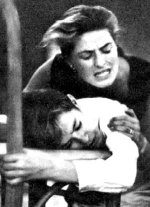 Then there is the bedroom scene in which the governess is so passionately groping Miles and begging him that she might be his savior. Though most of this conversation seems to be in reference to earthly matters, there is Miles’ hanging allusion to “this queer business of ours“, and a certain rather unearthly physical occurrence. And if we can’t believe the governess’ account here of “…an extraordinary blast and chill, a gust of frozen air and a shake of the room as great as if, in the wind, the casement had crashed in”, how can we believe that all she saw on the lawn that night, when she was expecting so certainly to see something else, was only little Miles? To what earthly purpose can we ascribe, during this room shaking gust of frozen air action, Miles’ “loud, high shriek” and the calm, cool, and collected manner in which he admits, “It was I who blew it, dear“, when the governess notices that the candle is out?
Then there is the bedroom scene in which the governess is so passionately groping Miles and begging him that she might be his savior. Though most of this conversation seems to be in reference to earthly matters, there is Miles’ hanging allusion to “this queer business of ours“, and a certain rather unearthly physical occurrence. And if we can’t believe the governess’ account here of “…an extraordinary blast and chill, a gust of frozen air and a shake of the room as great as if, in the wind, the casement had crashed in”, how can we believe that all she saw on the lawn that night, when she was expecting so certainly to see something else, was only little Miles? To what earthly purpose can we ascribe, during this room shaking gust of frozen air action, Miles’ “loud, high shriek” and the calm, cool, and collected manner in which he admits, “It was I who blew it, dear“, when the governess notices that the candle is out?
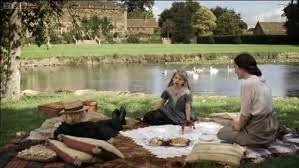 And, skipping a bit, what of the prodigious and unaccountable journey by Flora to a spot on the other side of the “Sea of Azof” where the governess had coincidentally first seen Miss Jessel? Why does this action fit so nicely as a piece in the governess’ puzzle? Why the withered ferns and, perhaps most of all, why the extremely odd happenstance that Flora never even feigns a glance in the direction which the governess is so excitedly pointing? If we ever thought anything, we thought, “Curiosity, thy name is Children”.
And, skipping a bit, what of the prodigious and unaccountable journey by Flora to a spot on the other side of the “Sea of Azof” where the governess had coincidentally first seen Miss Jessel? Why does this action fit so nicely as a piece in the governess’ puzzle? Why the withered ferns and, perhaps most of all, why the extremely odd happenstance that Flora never even feigns a glance in the direction which the governess is so excitedly pointing? If we ever thought anything, we thought, “Curiosity, thy name is Children”.
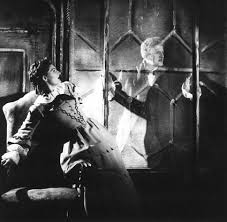 And the final scene, that scene of our ecstatic indecision; how can we really, textually, account for Miles’ naming of Quint? Can we really believe it is she, and only she, who frightens him, a young healthy boy, to death when he has shown himself quite bold and successful before in dealing with her bounding and boundless passion? If he was really so innocent and so frightened, why didn’t he take the opportunity to oblige himself, before the appearance of Quint at the window, of her offer to go outside if he wished?
And the final scene, that scene of our ecstatic indecision; how can we really, textually, account for Miles’ naming of Quint? Can we really believe it is she, and only she, who frightens him, a young healthy boy, to death when he has shown himself quite bold and successful before in dealing with her bounding and boundless passion? If he was really so innocent and so frightened, why didn’t he take the opportunity to oblige himself, before the appearance of Quint at the window, of her offer to go outside if he wished?
The only way out of all this is for us to ask all the questions in the other direction, but as soon as we start to feel a little relief from this, it occurs to us that they are just that, questions, and are as equally unanswerable. We are becoming quite uncomfortable in our frantic and seemingly futile search for some objective proof in this so cleverly contrived “clear field for the imagination”. We are beginning to be a bit really, as opposed to fictionally, upset and we are beginning to question the audacity of James to manipulate events in such a way as to so horrify us without, what we have so far been able to see, a properly profound reason. If children are to be killed and driven mad, either the ghosts must be real, or the governess completely corrupt, quite insane, or both. As we feel a more or less real horror from this complete fantasy, we start turning to ourselves and to reality for answers. We question the reality of ghosts. If we believe in them, or are open to their existence, we can accept or argue to the same degree the evil outcome of the story along this line. If we don’t believe in them, or are less open to their existence, we have only the governess on whom to place the blame for the ugly happenings. And so, if we are more inclined to this latter belief, it is back to her we turn focusing more intensely on her startling cognitions of ghosts.
Oscar Cargill has done a brilliant job of psychoanalyzing the governess. He has shown an actual Freudian case with striking parallels to the story and argued quite effectively for James’ awareness of this case. He has shown similarities between the governess and James’ mentally ill sister, Alice and, from all of this, though the similarities and background conditions he sees may very probably be a part of the plan of The Turn of the Screw, he argues the book to be the case study which James most expressly stated it was not. It is nice to see the similarities, but it is necessary to see the differences. Not only do we have to ignore very many of the governess’ contradicting characteristics to label her, in some Freudian sense, unbalanced, but there is just too much else in the story outside of the governess’ perceived version which stands against our being able to conclude the nonexistence of the ghosts. We can’t put labels or values on her mental or physical behavior until we can decide this question. Besides, we are left with all of our original evil if we accept Mr. Cargill’s conclusion that James wrote this tale that could be plausibly read as a ghost story as a sort of fictional history of his sister Alice hoping that in time his central motif, a mad protectress betraying her charges, would emerge and his transcendent skill as an author be understood.13 This all sounds pleasant, harmless, and semi-clever enough on paper, but we somehow can’t quite give it our approval as being parallel enough to anything worthwhile or ingestible in real life. Of course, if we accept John Enck’s principle that there is some sort of “self conscious awareness [by the artist] that true art does not, cannot, incorporate ‘reality’ (or life) but, instead, refers to itself and its own nature”,14 we may be able to accept such an interpretation. However, we might hope to be able to believe in a principle of a self-conscious awareness by the artist that there is absolutely nothing outside of “reality” (or life) and that the truest goal of art is to reflect this.
It is the governess who says there are ghosts; it is the governess who says the children are possessed thus robbing us of our sense of their innocence; and it is the governess who is all too actively on the scene at both the sickness of Flora and the death of Miles, so let’s try to uncover some of the evidence which points toward the possibility of her not being insane, corrupt, or a liar as this is the exact opposite direction in which we are probably anxious to look.
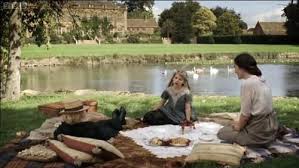 The scene in the garden on the shore of the little lake (if we can figure out where this is) where the governess and Flora while away “an afternoon hour” has been used quite often to show the governess at her worst. Well, at her worst she appears to be, but there are certain considerations which tend to show that the hysterical behavior she exhibits later with Mrs. Grose may be somewhat grounded and that this behavior doesn’t necessarily preclude the unreality of her sighting of the ghost of Miss Jessel or Flora’s supposed awareness of the presence.
The scene in the garden on the shore of the little lake (if we can figure out where this is) where the governess and Flora while away “an afternoon hour” has been used quite often to show the governess at her worst. Well, at her worst she appears to be, but there are certain considerations which tend to show that the hysterical behavior she exhibits later with Mrs. Grose may be somewhat grounded and that this behavior doesn’t necessarily preclude the unreality of her sighting of the ghost of Miss Jessel or Flora’s supposed awareness of the presence.
It should be noted that the entire substance of this scene is not rounded off until several pages later and it is only the cunning presentation of all the information in it by our author, James, that has us leaping and bounding to premature conclusions and feelings in a similar manner to that which we accuse the governess. The actual description of the event by the governess is very sketchy and thin leaving us with a very incomplete understanding of just what actually happened. It is because of this 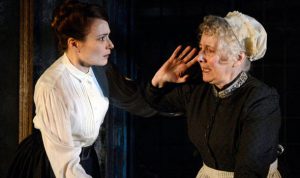 inadequate information that we are so quick to jump on her in the next scene with Mrs. Grose when she relates to her things that don’t seem for us to correlate. She seems completely hysterical and, in this state, jumping to the most drastic conclusions, indeed, even to be out and out lying and forcing her baseless suppositions upon us and Mrs. Grose as facts. We immediately not only condemn her for the evil intentions she seems to be forcing on an innocent child, but we are brought again, because of her thin description, to wonder strongly about whether or not she has seen any such thing as she would have us believe. And, if she hasn’t here, then she hasn’t before and she is quite insane.
inadequate information that we are so quick to jump on her in the next scene with Mrs. Grose when she relates to her things that don’t seem for us to correlate. She seems completely hysterical and, in this state, jumping to the most drastic conclusions, indeed, even to be out and out lying and forcing her baseless suppositions upon us and Mrs. Grose as facts. We immediately not only condemn her for the evil intentions she seems to be forcing on an innocent child, but we are brought again, because of her thin description, to wonder strongly about whether or not she has seen any such thing as she would have us believe. And, if she hasn’t here, then she hasn’t before and she is quite insane.
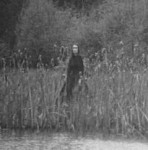 The element left out here that causes us to turn against her so decidedly is an adequate description of Flora’s awareness of Miss Jessel. We might forgive, though perhaps not condone, her hysteria if she has indeed seen another ghost, for she is now outnumbered and is every bit as uncomfortable as we would be in the same situation. And if this female ghost is in fact real, is it really so unbelievable that she should be able, from her prior knowledge of Miss Jessel, to produce the mental associations and connections that allow her the initial naming? Do not the associations which the governess assumes become somewhat justified by the subsequent information imparted by Mrs. Grose about the real associations between Quint and Jessel and Miles and Flora? If Quint is real, is another minute physical description of exact characteristics really necessary for Mrs. Grose or us to believe in the reality of a so plausible second ghost? Has she not already convinced Mrs. Grose? Well, partially, yes, but not altogether and it is for this reason that she writes in the next chapter, after we have already made up our minds against her, “It was a pity that I should have had to quaver out again the reasons for my not having, in my delusion, so much as questioned that the little girl saw our visitant even as I actually saw Mrs. Grose herself, and that she wanted, by just so much as she did thus see, to make me suppose she didn’t, and at the same time, without showing anything, arrive at a guess as to whether I myself did! It was a pity that I needed once more to describe the portentous little activity by which she sought to divert my attention – the perceptible increase of movement, the greater intensity of play, the singing, the gabbling of nonsense, and the invitation to romp.”
The element left out here that causes us to turn against her so decidedly is an adequate description of Flora’s awareness of Miss Jessel. We might forgive, though perhaps not condone, her hysteria if she has indeed seen another ghost, for she is now outnumbered and is every bit as uncomfortable as we would be in the same situation. And if this female ghost is in fact real, is it really so unbelievable that she should be able, from her prior knowledge of Miss Jessel, to produce the mental associations and connections that allow her the initial naming? Do not the associations which the governess assumes become somewhat justified by the subsequent information imparted by Mrs. Grose about the real associations between Quint and Jessel and Miles and Flora? If Quint is real, is another minute physical description of exact characteristics really necessary for Mrs. Grose or us to believe in the reality of a so plausible second ghost? Has she not already convinced Mrs. Grose? Well, partially, yes, but not altogether and it is for this reason that she writes in the next chapter, after we have already made up our minds against her, “It was a pity that I should have had to quaver out again the reasons for my not having, in my delusion, so much as questioned that the little girl saw our visitant even as I actually saw Mrs. Grose herself, and that she wanted, by just so much as she did thus see, to make me suppose she didn’t, and at the same time, without showing anything, arrive at a guess as to whether I myself did! It was a pity that I needed once more to describe the portentous little activity by which she sought to divert my attention – the perceptible increase of movement, the greater intensity of play, the singing, the gabbling of nonsense, and the invitation to romp.”
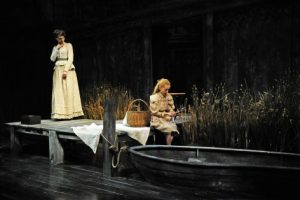 Of course it would be extremely cruel of the governess to see some unnatural intent in all of this if all Flora was doing was being childishly gay, but if this passage, along with all the innuendo preceding and following it, were inserted in its proper sequence in the scene, it would at least keep our sense of wonder on more of an even keel. However, an even keel was the very last of James’ intentions and though we wonder what could possibly be his purpose for contriving such a severe storm on the sea of our consciousness’, we are beginning to understand that the only way we are going to keep ourselves from drowning is with the most single-mindedly focused attention to the chores of tending our sails, keeping our bow to the wind, and, most of all, bailing and bailing the voluminous quantities of chaotic substance coming in upon us. The thing to see in all the above is that there is no way to label as “inadmissible” that which the governess sees as “portentous” unless we resort to the exact same behavior of which we are accusing her. If James intermingles the sequence by which we view the chicken and the egg, he never fails to show us both, and, as for being able to decide which came first, well, that will remain an eternal mystery to us – and a literary triumph for H.J.
Of course it would be extremely cruel of the governess to see some unnatural intent in all of this if all Flora was doing was being childishly gay, but if this passage, along with all the innuendo preceding and following it, were inserted in its proper sequence in the scene, it would at least keep our sense of wonder on more of an even keel. However, an even keel was the very last of James’ intentions and though we wonder what could possibly be his purpose for contriving such a severe storm on the sea of our consciousness’, we are beginning to understand that the only way we are going to keep ourselves from drowning is with the most single-mindedly focused attention to the chores of tending our sails, keeping our bow to the wind, and, most of all, bailing and bailing the voluminous quantities of chaotic substance coming in upon us. The thing to see in all the above is that there is no way to label as “inadmissible” that which the governess sees as “portentous” unless we resort to the exact same behavior of which we are accusing her. If James intermingles the sequence by which we view the chicken and the egg, he never fails to show us both, and, as for being able to decide which came first, well, that will remain an eternal mystery to us – and a literary triumph for H.J.
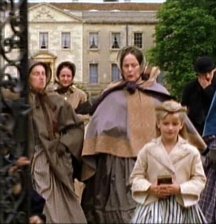 Another scene of interest is the one of the walk to church in which Miles and the governess lag behind Mrs. Grose and Flora at a presumably inaudible distance and engage in the conversation that they each seem to take so differently. Above and beyond the governess’ actions in this scene, it is unique to this story in a certain sort of way and it is a bit inconsistent, though perhaps not to an unacceptable degree. It seems to be the only major, extended scene in which either of the children’s, Miles in this case, actions or words tend to point, in the final
Another scene of interest is the one of the walk to church in which Miles and the governess lag behind Mrs. Grose and Flora at a presumably inaudible distance and engage in the conversation that they each seem to take so differently. Above and beyond the governess’ actions in this scene, it is unique to this story in a certain sort of way and it is a bit inconsistent, though perhaps not to an unacceptable degree. It seems to be the only major, extended scene in which either of the children’s, Miles in this case, actions or words tend to point, in the final 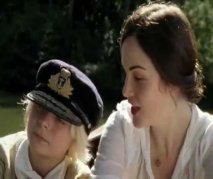 analysis, toward a wholly innocent meaning. Miles seems to be clearly talking about only one thing – getting back to school to be with other boys to learn about worldly things. It is a strong temptation to equate the exactitude of Miles’ meaning here with the meaning of his, as well as Flora’s, actions and statements in other parts of the story and accord the connotations of this scene to the story as a whole. For many arguments against the governess this scene has carried considerable weight. However, it can be viewed as only a curious inconsistency, or change in tactics by James, and can perhaps be seen to be matched in an equivocal manner by the inconsistence in the behavior
analysis, toward a wholly innocent meaning. Miles seems to be clearly talking about only one thing – getting back to school to be with other boys to learn about worldly things. It is a strong temptation to equate the exactitude of Miles’ meaning here with the meaning of his, as well as Flora’s, actions and statements in other parts of the story and accord the connotations of this scene to the story as a whole. For many arguments against the governess this scene has carried considerable weight. However, it can be viewed as only a curious inconsistency, or change in tactics by James, and can perhaps be seen to be matched in an equivocal manner by the inconsistence in the behavior 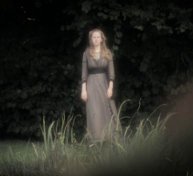 of the governess herself. Though she leaps and bounds, croaks and chokes, shivers, shakes and quakes and finally runs home in a state of hysteria and sees the ghost of Miss Jessel in her completely unwarranted reaction to this basically simple, straight forward conversation, it mustn’t go unnoticed that her later actions in regard to it are in no way discrepant to the real content of this conversation between her and Miles. In fact, they are quite commendably responsible to it. Without delay, and disregarding her strict instructions, she immediately pens a letter to the Master demanding his audience regarding this earthly problem and incontrovertibly leaves it for a real Luke to pick up and post to begin a real solution to this real situation. This one act seems to absolve her from everything, for she is finally, before the slightest bit of harm is done, reaching for help from outside. It is innocent little Miles who steals this letter thus thwarting its posting and his own salvation.
of the governess herself. Though she leaps and bounds, croaks and chokes, shivers, shakes and quakes and finally runs home in a state of hysteria and sees the ghost of Miss Jessel in her completely unwarranted reaction to this basically simple, straight forward conversation, it mustn’t go unnoticed that her later actions in regard to it are in no way discrepant to the real content of this conversation between her and Miles. In fact, they are quite commendably responsible to it. Without delay, and disregarding her strict instructions, she immediately pens a letter to the Master demanding his audience regarding this earthly problem and incontrovertibly leaves it for a real Luke to pick up and post to begin a real solution to this real situation. This one act seems to absolve her from everything, for she is finally, before the slightest bit of harm is done, reaching for help from outside. It is innocent little Miles who steals this letter thus thwarting its posting and his own salvation.
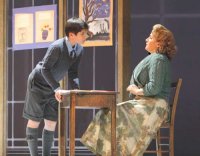 Of course, after having admitted stealing the letter and upon being questioned as to what he found in it, Miles replies, “nothing”. This “nothing” may appear to us on our first reading to mean only “nothing” concerning the person of Miles. but it only takes a second reading to see that this “nothing” could as easily mean absolutely “nothing” at all. This conception of completely blank pages seems to fill our minds with the picture of a governess with an ability for cruel deception almost unimaginable, and we wonder with what authority we can check to confirm the proper interpretation of this critical word. There must be one that can provide us with a definitive answer, for as Mr. Alexander Jones wondered, “Once an erosion of authority begins, who can say where it must stop?”15 But there is something uncomfortably non-linear about all of this, and we wonder about this “…annexed but independent world in which nothing is right save as we rightly imagine it”.16 Are we right in imagining this story to be some sort of ‘Mobius Strip’ for our thought processes? Everywhere there seem to be these knotty consciousness problems and they seem to be as bold as we are bold to look at them. And for their solution, they seem to keep returning only onto themselves.
Of course, after having admitted stealing the letter and upon being questioned as to what he found in it, Miles replies, “nothing”. This “nothing” may appear to us on our first reading to mean only “nothing” concerning the person of Miles. but it only takes a second reading to see that this “nothing” could as easily mean absolutely “nothing” at all. This conception of completely blank pages seems to fill our minds with the picture of a governess with an ability for cruel deception almost unimaginable, and we wonder with what authority we can check to confirm the proper interpretation of this critical word. There must be one that can provide us with a definitive answer, for as Mr. Alexander Jones wondered, “Once an erosion of authority begins, who can say where it must stop?”15 But there is something uncomfortably non-linear about all of this, and we wonder about this “…annexed but independent world in which nothing is right save as we rightly imagine it”.16 Are we right in imagining this story to be some sort of ‘Mobius Strip’ for our thought processes? Everywhere there seem to be these knotty consciousness problems and they seem to be as bold as we are bold to look at them. And for their solution, they seem to keep returning only onto themselves.
As a further example of this returning, let’s return to a couple of scenes we’ve already discussed. In the first scene where Flora is at the window in the middle of the night, the governess is absolutely sure that Flora has lied about not seeing anyone out on the lawn. Knowing that the governess has just seen Quint, and reading all the other innuendo into the scene that we have, perhaps we doubt with her. However, in the scene where Flora is again at the window, and before the governess has even yet had a chance to look out herself, she says of Flora, “That she now saw, as she had not, I had satisfied myself, the previous time – was proved to me by the fact that  she was disturbed neither by my re-illumination [of the candle] nor by the haste I made to get into slippers and into a wrap”. What does this statement do? Well, it seems to exonerate Flora completely from at least part of the deception that the governess accused her of in the first circumstance, but to what degree? To the same degree, of course, that she herself is exonerated from being either deluded or a liar, for if she were either, what possible purpose could she have for disconnecting events which seem even to us so provocatively connected?
she was disturbed neither by my re-illumination [of the candle] nor by the haste I made to get into slippers and into a wrap”. What does this statement do? Well, it seems to exonerate Flora completely from at least part of the deception that the governess accused her of in the first circumstance, but to what degree? To the same degree, of course, that she herself is exonerated from being either deluded or a liar, for if she were either, what possible purpose could she have for disconnecting events which seem even to us so provocatively connected?
Furthermore, but dissimilarly, knowing as she does, for she is writing eight to ten years later, that when she looks out she will only see Miles, what logical process allows her to write and let stand a sentence that convicts her of jumping to conclusions that never come true (seeing Jessel on the lawn) and which tends, in connection with other actions, to exonerate both children from any observable complicity with the ghosts? She seems to be proving and disproving her theories at the same time. There is something lacking here- some irreconcilable gap. We seem to have a weird sort of solidly impenetrable, yet substanceless wall of unexpatiation.
On top of all this is another provision that has never been properly counted into the story. There is most definitely the question of to what extent and degree the governess has either consciously or unconsciously pre-, or post-colored, transposed, or otherwise rearranged the events, situations, feelings and cognitions of her story due to the fact of her having written it so long after the actual event. Do not old soldiers have a tendency to tell war stories with a sense of romance and glory that we strongly suspect could only have been formed well after the real and bitter battle? When someone recounts some former disaster of which they were a part, do they not often narrate it in a way that makes the whole thing sound like a very exciting and overall worthwhile experience? Are we not always able with hindsight to see certain circumstances of an event more clearly than during the actual happening of it? And do we not tend to juxtapose all the thoughts we’ve had during the event and after it in a retelling?
In the case of the governess, knowing that we do that she knows, and is convinced to a certainty, of the true outcome of her story, how can we possibly convict her of being predisposed in her ideas when she writes such things as, “The only thing indeed that in this early outlook might have made me shrink again was the clear circumstance of her [Mrs. Grose] being so glad to see me…to be positively on her guard against showing it too much…and that, with reflection, with suspicion, might have made me uneasy”. These thoughts of hers were of course, and only could be, formed at the time of her writing, that is, eight to ten years after she arrives at Bly, and cannot conscientiously be used to dispose her in any manner whatever in the time frame of the actual event. (But of course we rather wonder just what sense that all between the above quotation marks makes in the evolution of her own tale, in her own words, which shows Mrs. Grose to be clearly and completely unprescient and unknowledgeable of anything whatsoever.) And can we predispose her to being highly nervous and fanciful when she says, “There had been a moment when I believed I recognized, faint and far, the cry of a child; there had been another when I found myself just consciously starting as at the passage, before my door, of a light footstep”, when she then qualifies it with, “But these fancies were not marked enough not to be thrown off, and it is only in the light, or the gloom, of subsequent matters that they now come back to me”. In other words, the degree and extent to which we can use this information and the chronology we assign to the meaning of it must remain eternally wonderful to us. Also we must wonder just how much the long and presumably peaceful time she has had between the occurrence and the writing has added to the unexpected and puzzling boldness that she portrays herself as having in dealing with these ghastly and ghostly affairs, and the impatience with which she sometimes awaits further developments. Being “as sure today as I was then” that these ghosts were real and the children possessed by them, absolutely sure in her mind – though we will never be – that it was a real battle she fought, we must necessarily wonder at such statements as, “…but I was in these days literally able to find a joy in the extraordinary flight of heroism the occasion demanded of me. I now saw [“now saw”?] that I had been asked for a service admirable and difficult; and there would a greatness in letting it be seen – oh, in the right quarter!” Just how much of this boldness and “literal joy” is she remembering accurately, and just how much of it is she feeling at the time of her writing, displaced as she is by time and space from the event? How can we decide as to when, and to what degree, these feelings of hers occurred? There just absolutely must be in her “I now saw”, a certain element of “I now see”. And to what degree has the passage of ten more lonely years which are rapidly turning her into a spinster affected her emphasis when she writes, “oh, in the right quarter!”. All of the sexual over- or undertones of the book must be read with the confusing sense of the transmigratory chronology that they necessarily possess.
Of her perhaps suggestive actions and descriptions in this vein towards Miles, we must remember that he would have been at the time of her writing about the age she was at the time of the occurrence. As anything is possible in this story, perhaps the intervening years did something here.  Furthermore, when we read, “catching my pupil in my arms, covered her with kisses in which there was a sob of atonement”, she appears to us hopelessly over-emotional and possessive before there is adequate reason to be. But how much of this emotionalism and possessiveness has been sequentially transposed or overemphasized due to her after-knowledge of the tragic outcome? It goes on and on to the point that every word of her narrative must be subjected to this consideration. Of course, we are arbitrarily supplying our own values and there is absolutely nothing to help us by way of pointing to degree, but we would be making an inattentive mistake in reading her account only in the present tense of it, and we would be remiss in the extreme to assume that James’ assurances of his intentions to make the governess appear to be an objective and accurate observer were his assurances that she absolutely is one. (The entire above discussion is based on the not unwarranted, but nevertheless, conjectural, assumption that Trinity is a college and that Douglas was a student of about 18 or 20 years old when he came home for the summer of his second year there and met the governess. However, he could have been a newly hired professor at the college, or then again, Trinity could have been a boy’s boarding school and his sister’s name may have been Flora. There are no patent facts to assure us of anything and our view of the governess’ tale could alter from moderately to drastically should we take one of these other outlooks upon the relationship between these two characters.)
Furthermore, when we read, “catching my pupil in my arms, covered her with kisses in which there was a sob of atonement”, she appears to us hopelessly over-emotional and possessive before there is adequate reason to be. But how much of this emotionalism and possessiveness has been sequentially transposed or overemphasized due to her after-knowledge of the tragic outcome? It goes on and on to the point that every word of her narrative must be subjected to this consideration. Of course, we are arbitrarily supplying our own values and there is absolutely nothing to help us by way of pointing to degree, but we would be making an inattentive mistake in reading her account only in the present tense of it, and we would be remiss in the extreme to assume that James’ assurances of his intentions to make the governess appear to be an objective and accurate observer were his assurances that she absolutely is one. (The entire above discussion is based on the not unwarranted, but nevertheless, conjectural, assumption that Trinity is a college and that Douglas was a student of about 18 or 20 years old when he came home for the summer of his second year there and met the governess. However, he could have been a newly hired professor at the college, or then again, Trinity could have been a boy’s boarding school and his sister’s name may have been Flora. There are no patent facts to assure us of anything and our view of the governess’ tale could alter from moderately to drastically should we take one of these other outlooks upon the relationship between these two characters.)
If we are ready, about now, from our difficulty in deciphering things, to dismiss the book as some sort of a mistake, it is the children and their tragic ends that bring us back to our struggle. We can’t let them go so easily into the depths of such seemingly futile evil. Emotionally, perhaps we tend toward Professor Goddard’s view that the true and beautiful theme of the book is that of “uncorruptible childhood”. “Miles and Flora, to be sure, are withered in the flame of the governess’ passion. But, corrupted never! And the withering of them in the flame is rendered tragic rather than merely horrible by the heroism that they display. The things that children suffer in silence! Because, as here, their heroism generally takes the form of endurance rather than that of daring, rarely, if ever, in literature or in life, is justice done to the incredible, the appalling courage of childhood. This story does justice to it.” Lofty, noble, worthy thoughts to be sure, but grounded and true only by as much as we are able to see the governess completely insane and corrupt, and it is on this very point that we are so undecided. Professor Goddard’s vision is valid by deciding to a certainty that it is “real life” the children show which the governess cruelly labels “policy”; that their aloof actions, their unchildish rationalism, and their ambiguity is a completely false portrayal by an incredibly evil person. We have to place so many values so many places where the existence of none were so expressly and craftily nonstated. We have to give flesh and bones to these characters in this story of a “conceived tone”. We have to see as real this “annexed but independent world”, and we have to see insanity, corruption, evil, hate, and tragedy in this “fairy tale pure and simple”. And yet one child dies and another is mentally undone in the presence of a very active governess. We are given basically two alternatives, the governess is responsible or the ghosts are responsible, and either way we look at it we have an ugly, evil, pointless, moral-less story. (In passing, it must be said that Professor Goddard’s essay is well worth a bit of study in itself. Not only is it ironically parallel in form to James’ tale, with its posthumous publication, its prologue, its own mad governess, etc., but it has its own certain “unattackable ease” of argument which is a curious thing to behold upon a different understanding than its own.)
Before concluding, I will say that former critics have been pulled out of their own context for arguments within this essay with the consciousness that the intelligence shown overall in their pieces has been neglected. This has been reckoned as part of the game and no harm or depreciation is meant – especially to such critics as Edmond Wilson, John Lydenburg, and Leon Edel. Indeed, all criticism has added immensely to the tale and, as has been noted before, should be read as part of it. However, former criticism, though interesting, intelligent, and inventive, has only been able to justify this book in the terms of some form that the better arguments can’t even convince themselves really exist, and they self admittedly stew in the chaos, confusion, and evil that seem to defy dispersion. The final truth about these strange happenings at Bly seems to have existed sort of subconsciously in the backs of some critics’ minds. But, though this knowledge may always exist for us, as it did for James, in the back of the mind, the trick is to try to move it from the subconscious to the conscious – if only for an instant.